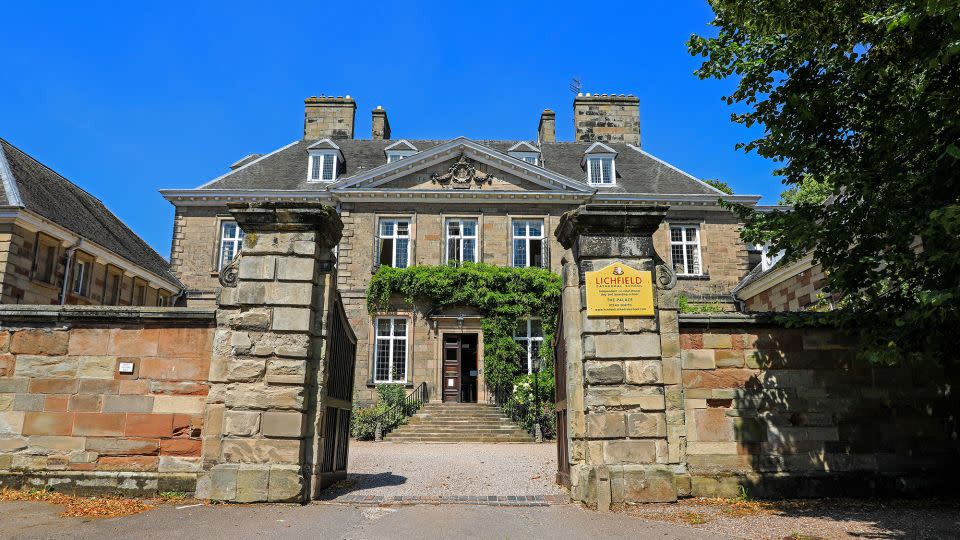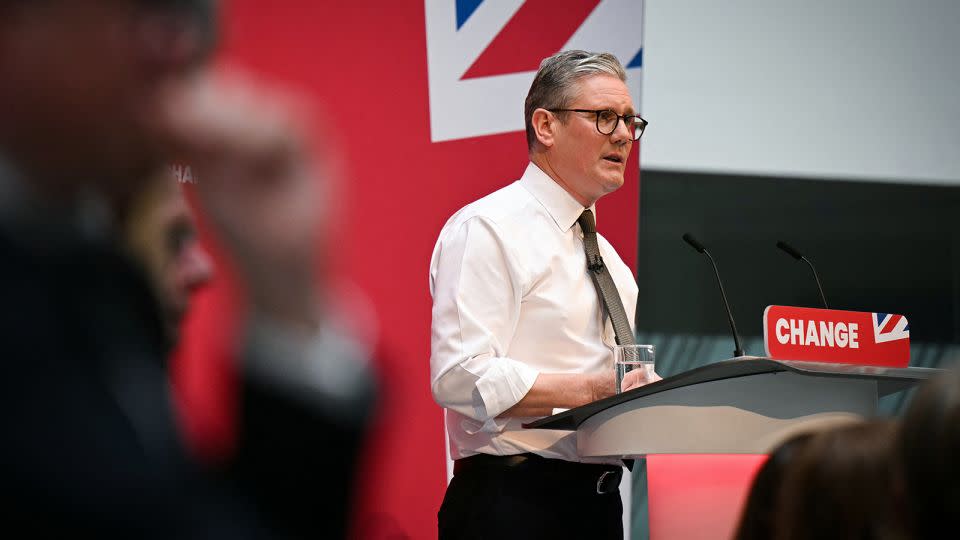Want your child to go to Eton? Get ready to pay $13,000 more each year
Private schools in Britain conjure up images of rolling lawns, pristine tennis courts, and dormitory rooms, serving as gilded hothouses of privilege. Eton College, perhaps the most famous, has educated no fewer than 20 UK prime ministers.
These schools may soon become even more exclusive if the opposition Labour Party wins the country’s general election next month — which polls suggest it will do by a wide margin — and abolishes a long-standing 20% tax break on their fees.
If Eton raises its fees by the full amount, rather than finding other ways to foot its bigger tax bill, parents sending their child to the illustrious school can expect to pay an extra £10,500 ($13,360) per year on top of the current standard fees of £52,750 ($67,107).
Labour estimates that taxes on private schools will raise £1.5 billion ($1.9 billion) a year, money it says is urgently needed to improve the state school system, which is used by about 93% of pupils. The policy appears to have widespread support — an opinion poll conducted last week by YouGov found that almost two-thirds of respondents backed the idea.
But private schools are pushing back hard, saying it could mean financial ruin for many of them and force thousands of children — some from very modest backgrounds and with special educational needs — to switch to hard-pressed state schools.
Not every private school is “synonymous with privilege and great wealth,” argues Sue Hannam, headteacher at Lichfield Cathedral School, a private school in central England. The vast majority of private, or so-called “independent,” schools in the United Kingdom have “very little in common” with their larger, more famous peers.
“We’ve got a number of parents where not only do both of (them) work, but some parents work more than one job… They’re not driving the newest cars, they’re not taking massive holidays,” she told CNN.
It is these parents — paying up to £16,600 ($21,079) a year to educate a child at Lichfield — who are deeply concerned about the proposed tax, Hannam said.
About 620,000 children are currently enrolled in private schools in Britain, equivalent to almost 6% of all school children, according to the Independent Schools Council.
Collectively, the country’s 2,500 private schools generate fee income of about £9.42 billion ($12 billion) a year, based on CNN calculations using the ISC pupil numbers and figures from the Institute for Fiscal Studies (IFS) on average school fees.

And about half of private schools in England are registered as charities, according to the government, because, under English and Welsh law, they are involved in the “advancement of education” and thus provide a benefit to the public.
That status makes them eligible for an additional tax break — a discount of up to 80%, and sometimes more, on a tax applied to commercial properties — on top of the exemption to pay the 20% sales tax.
In its manifesto, published last week, Labour says it plans to scrap both tax breaks. The funds would be spent on recruiting 6,500 new teachers for state schools, particularly in subjects where there are shortages, and giving students in every state school access to a mental health professional, among other plans.
“In our state secondary schools, we’ve got thousands of teachers missing in the subjects that we need,” Labour leader Keir Starmer said on Sky News television earlier this month. “Let’s take maths: too many students… are being taught maths by sports teachers, by supply teachers, and that’s not acceptable.”
Starmer argued that adding VAT to private schools fees was necessary to recruit teachers “to make sure every child, wherever they come from, whatever their background, whichever school they go to, has the same opportunity.”
UK state-funded schools are beset with problems. On one key metric, the number of teachers recruited for the current academic year was 38% below the government’s target. And, in a report in November, lawmakers said “unacceptable numbers of pupils are learning in poorly maintained or potentially unsafe buildings.”
The VAT levy is likely to be passed on to parents, according to Louis Hodge, an associate director at the Education Policy Institute, an independent research organization. In theory, private schools could keep their fees relatively stable and make savings in their budgets. “In reality, that’s probably not going to happen,” he told CNN.
An exodus?
Labour has been advocating for an end to tax breaks for private schools for years, but concern among parents has grown over the past year or so, according to an ISC spokesperson, as a Labour government has become increasingly likely.
In its latest annual report, the association said it had seen a 2.7% drop in the number of new students in its schools in the current academic year compared with the previous year. That is the biggest annual decline since the ISC began collecting the data in 2011.
Loveena Tandon, a single mother, sends her 16-year-old daughter and 14-year-old son to private schools in London at a cost of between £42,000 and £48,000 ($53,000-$61,000) a year.
If enacted, Labour’s policy makes it “highly likely” that she’ll have to move them, she told CNN.
“My son has just started making friends… it’ll be devastating, the impact. I find it very hard to sleep at night figuring out what I need to do… (My daughter is) very well-settled… it’s just cruel to take them out,” she said.
Julie Robinson, chief executive officer of the ISC, fears there will be many parents in Tandon’s position under a Labour government.
“What we think will happen as a result (of Labour’s VAT policy) is unfortunately tens of thousands of children will be displaced,” she told CNN. “They’ll have to seek another school (and), on the whole, they’ll be going into the state system — and that means more pressure on the already stretched state system.”
Contrary to stereotypes, typical UK private schools work to “very tight budgets,” are small — half of the schools represented by the ISC have fewer than 285 students — rural, and educate younger children, Robinson added. And a fifth of students in ISC schools have special educational needs, the association said in its annual report.
“In recent years, independent schools have increased their fees assistance. Over a third of children in our schools receive some kind of fee discount already,” Robinson said. ISC schools provide nearly £1.1 billion ($1.4 billion) worth of support to parents to help with fees, up 6.8% from last year, according to the ISC’s report.
Christine Cunniffe, the principal of LVS Ascot, a private school in the southeast of England, predicts that a 20% hike to fees will result in her school’s student population being 20% lower than it otherwise would be.
That’s because some parents are expected to take their children out of LVS Ascot, while others are likely to decline offers for their children to start at the school in September.
“That’s what we’re bargaining for,” Cunniffe told CNN. “I just feel sorry for those children being wrenched away from their peers.”
‘Relatively small impact’
Others, however, think the effect of Labour’s taxes on private schools and the knock-on impact on their state-funded peers will be small.
Hodge at the Education Policy Institute noted that, accounting for inflation, private school fees had risen by as much as 25% since 2010.
“(Over) that same time, we’ve seen basically no change in the number of (students) that actually go to independent schools. That’s remained pretty constant,” he said. That would imply a “pretty inelastic” demand for private school education, h e said.
The private school sector is also “more dynamic than is appreciated,” Luke Sibieta, a research fellow at the IFS, an independent think tank, told CNN. Since 2014, at least 20 to 30 schools — mostly smaller schools running on tight budgets — have shut each year, usually because they could not enroll enough students, he said.

And the impact on state schools?
The IFS estimates that the number of children in private schools will fall by between 20,000 to 40,000 over the next few years under Labour’s tax policies compared with the scenario in which private schools continue to receive tax breaks.
“People moving from the private sector to the state sector clearly causes a demand on the state sector. We don’t think it’ll be huge, though,” he told CNN. “Adding VAT would probably have a relatively small impact.”
The IFS estimates that the extra students entering state schools will cost the public purse up to £300 million ($382 million) a year.
Still, a demographic shift means state schools may “welcome” the influx, Sibieta wrote last year. “It should be remembered that (student) numbers in the state sector are expected to fall dramatically over the next decade,” he wrote.
For more CNN news and newsletters create an account at CNN.com

 Yahoo Finance
Yahoo Finance 